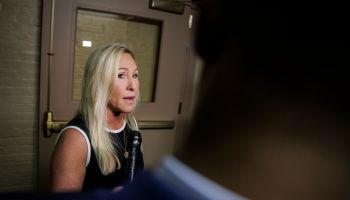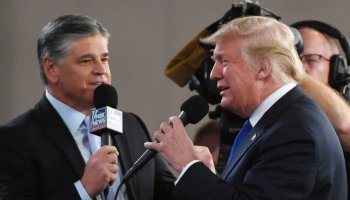In his famous “I Have a Dream” speech at the March on Washington for Jobs and Freedom on August 28, 1963, the Rev. Dr. Martin Luther King, Jr., spoke of a “table of brotherhood” where people from different backgrounds could sit down, break bread and discuss their differences, all in a hope to get to know one another better.
Well, this week in Los Angeles, I sat down with Herndon Craddick, senior director of programs and communications with GLAAD, to discuss the recent tweets that I sent out on Super Bowl Sunday. GLAAD had previously expressed that my tweets were homophobic and called for violence against gays and lesbians. As I said that night on Twitter, as well as to Herndon directly, that was not the case; and in no way would I even suggest such a thing. I indicated that I would meet with GLAAD, and they likewise said they wanted to meet with me. And so we did.
Over breakfast for over 90 minutes, Herndon shared his thoughts with regards to my tweets and why he deemed them offensive to the LGBT community, and I reiterated my apology that — that if anyone who construed my comment as being anti-gay or homophobic, or advancing violence, that was not my intent, and for that I was truly sorry.
It was a discussion that touched on many other areas, and as GLAAD expressed in a statement afterwards — and a sentiment with which I concur — “Both parties came away with a better understanding of one another and look forward to continuing this dialogue.”
Some might say this is just semantics, but really, it isn’t. When anyone has a disagreement, whether public or private, there should be a call to sit down and sort it out, as opposed to both backing into corners, ratcheting up the noise to the point where no one hears one another. That benefits no one.
Now, do we agree on all issues? No. But, ironically, I have historically supported many of the issues important to the GLAAD agenda, such as ending the “Don’t Ask, Don’t Tell” policy; gay adoption; and including gays in hate crimes laws. Those, folks, are facts. But it is only through dialogue do we get an opportunity to see each other’s perspective and learn what it is like to walk in that person’s shoes.
So what now? Well, first, it is important to understand that I operate in the role of a journalist — not an activist — one who is used to participating in and leading the difficult discussions, whether on TV, radio, in print, or online. As I said to Herndon, on this show, we speak to the African-American community. And as I’ve said on many occasions, the Black community should, and must, discuss the issues involving sexual orientation — whether it’s personal, with regards to the church, in our families, or our schools. And I’ve been a vocal opponent of bullying, whether that involves heterosexuals or gay youth.
Now, have we had these discussions? Yes. Will we continue to have these discussions? No doubt. My goal as host and managing editor of “Washington Watch” is to shine a light on the issues and then peel back the complex layers so we all have a much better understanding.
Now, if you’re gay or straight, your voice matters. If you are a pastor or activist, your voice matters. I have no plan to abandon my goal as a truth teller on a variety of issues; and, yes, that includes those that may be on the LGBT agenda. I am confident that this table can serve as an example of Dr. King’s “table of brotherhood,” and I and this excellent team will do all we can to advance the dialogue so we all can learn, grow and prosper together.
That’s my perspective. What’s yours?
Perspective: At The Table Of Brotherhood, Discussing Differences was originally published on newsone.com
















